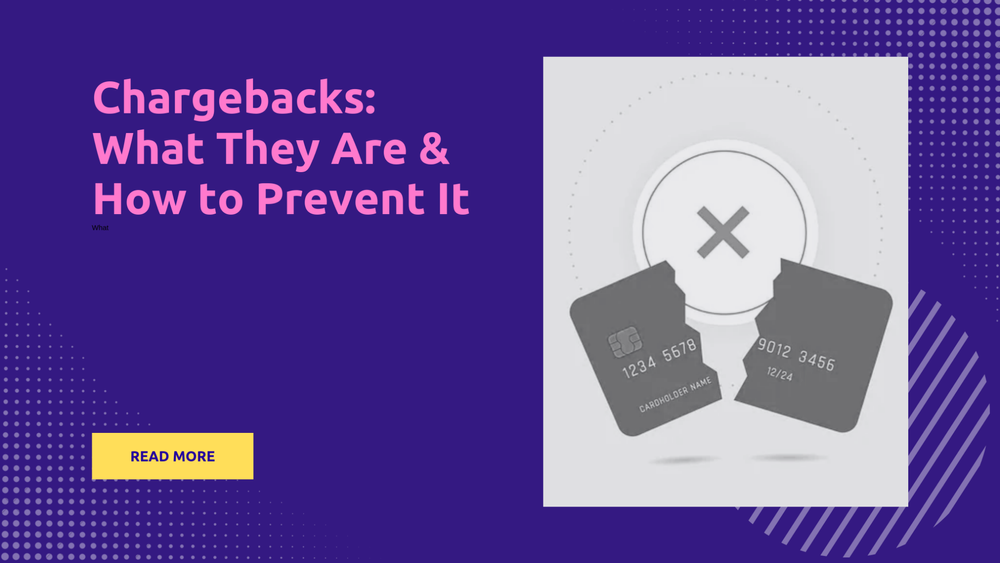Retain More Customers with Smart Retention Analytics!
By Sonaksh Singh Rawat on
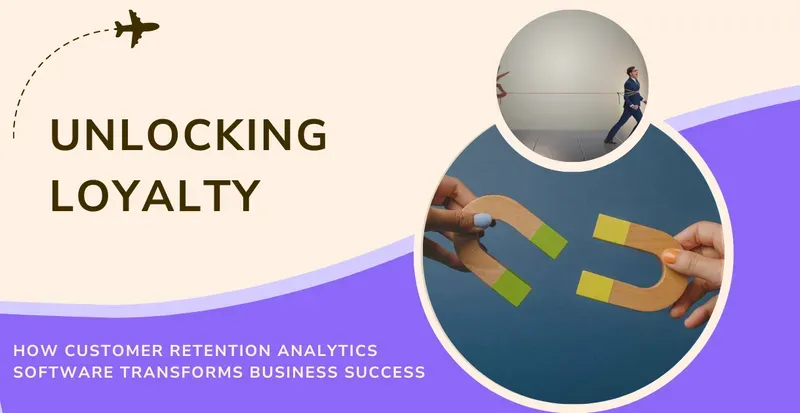
10 Customer Retention Software & Tools That Will Boost Your Sales
Holding onto customers is essential for business success. In today’s overcrowded marketplace, it’s more important than ever to ensure customers stay loyal. Using customer retention software is a strategic way to achieve this aim.
Customer retention management software provides a comprehensive approach to tracking and enhancing customer relationships. This cutting-edge tool helps in identifying key customers, understanding their preferences, and crafting personalized marketing strategies to keep them interested and loyal.
This article explores 10 outstanding customer retention software applications that promise to boost sales. Each option offers a variety of features, making it easier to find one that suits a business’s specific needs.
What is a customer retention software?
Customer retention software, also known as customer relationship management (CRM) software, acts as a specialized tool designed to enhance the relationship between businesses and their customers. The primary goal of this software is to reduce the churn rate (the rate at which customers stop doing business with a company) and increase customer retention and loyalty.
Types of customer retention software
The landscape is filled with a wide array of customer retention platforms, each offering unique features and benefits. Among these, several types of customer retention software have distinguished themselves based on their distinct functionalities and advantages.
Customer Relationship Management (CRM) software plays a crucial role for firms focusing on closely monitoring and managing their customer interactions. This advanced software can capture customer demographics, purchase history, and support conversations. It excels by enabling the creation of automated marketing strategies and evaluating their effectiveness.
In today’s competitive market, customer support software emerges as a vital component for companies striving to improve their customer service offerings. This tool provides comprehensive solutions, including management of customer support tickets, tracking of customer interactions, and availability of extensive knowledge bases and self-help options. Additionally, it gains an edge by collecting crucial customer feedback, thus highlighting areas for further enhancement of the customer experience.
Customer Loyalty Solutions: These invite businesses to reward their loyal customers for their continuous support. This software facilitates the creation and management of loyalty programs, tracking of loyalty points, and rewarding customers appropriately. By implementing customer loyalty software, businesses can increase customer interaction and encourage longer relationships.
Customer Feedback Software: They reveal vast opportunities for businesses eager to enhance their products and services. This platform isn’t limited to collecting feedback; it offers tools for designing surveys, monitoring social media reactions, and assessing customer satisfaction levels. Leveraging customer feedback software enables businesses to identify their strengths and areas for improvement, leading to a better range of products, improved services, and an unparalleled customer experience.
Customer Segmentation Solutions: They assist businesses in smartly categorizing their customers into distinct groups based on their age, purchasing behavior, and other criteria. These advanced tools help companies personalize their marketing efforts for each segment, ensuring messages have a greater impact. By using customer segmentation solutions, businesses are better equipped to amplify their promotional activities and strengthen customer relationships.
Best 8 customer retention software that will boost your sales
Here are the top 10 customer retention software tools you should consider investing in. These tools are designed to enhance sales significantly and helps in creating memorable customer experiences, ensuring that the audience remains engaged, thus contributing to the brand’s revenue stream.
1. Zendesk
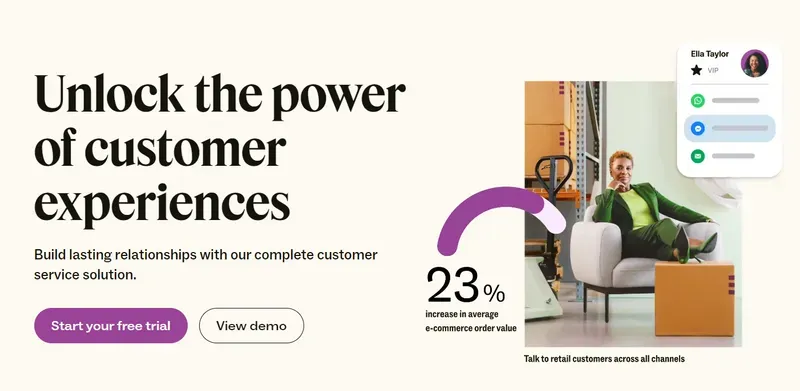
Zendesk emerges as a pioneering, cloud-based software suite aimed at augmenting customer service and Customer Relationship Management (CRM) across a diversity of businesses. This platform is meticulously developed to elevate customer support efficacy and encourage enhanced customer retention rates.
Zendesk comes equipped with several notable features, including:
- Ticket Management: The ticket management system offered by Zendesk enables organizations to efficiently monitor and resolve customer support requests. With a comprehensive dashboard, all customer communications are displayed, making it easier for companies to quickly identify and address client issues.
- Knowledge Base: Zendesk allows organizations to create and maintain a self-service resource for customers. This feature aims to reduce the volume of customer support inquiries, helping businesses streamline their support operations, significantly improving customer retention rates.
- Instant Messaging: Zendesk’s instant messaging function facilitates immediate support for clients, potentially improving customer satisfaction and reducing the time to resolve customer issues.
- Call Center Capabilities: Central to Zendesk is its powerful call center feature, which allows companies to manage incoming and outgoing calls seamlessly, enhancing the productivity of customer service activities.
- Customer Relationship Management (CRM) with Zendesk: By leveraging Zendesk’s CRM tools, businesses can improve tracking and management of customer interactions, foster customer loyalty, and increase customer retention. This aspect is crucial for nurturing strong relationships with customers.
Zendesk is highly regarded by businesses of various sizes due to its user-friendly interface and broad range of features. Furthermore, it is designed for scalability, making it suitable for businesses to grow and adapt alongside their evolving needs.
An extensive array of functionalities:
- Scalable Solutions: In today’s fast-paced business environment, companies seek strategies and technologies that can grow with them. This involves adopting flexible yet robust approaches that remain effective as the business expands. The emphasis is on scalability, ensuring operational agility and reliability for businesses poised for growth.
- Affordability: Recognizing the significance of budget considerations, the pricing structure is crafted to deliver exceptional value without compromising quality. This approach ensures accessibility of services across different budget constraints.
- Exceptional Customer Support: Excellent customer support is paramount for businesses, acting as a versatile tool for addressing customers’ needs, issues, and inquiries. It goes beyond solving problems—it builds a foundation of trust and reliability. Ensuring responsive and reliable customer support encourages customer loyalty, making it a critical factor for business success in the competitive market.
Downsides of Zendesk:
While Zendesk is renowned for its user-friendly interface and comprehensive features, it comes with certain limitations.
The cost, in particular, may pose a challenge for small businesses or startups working within a tight financial framework, potentially making it a less viable option for newcomers to customer support tools.
The customization process may also present difficulties, leading to a more complex learning journey for teams aiming to adapt the platform to their unique requirements. Furthermore, the sheer range of features offered by Zendesk could overwhelm new users unfamiliar with the system.
Additionally, though the platform is generally dependable, there have been sporadic instances of delayed response times during high-traffic intervals. This might affect the efficiency of customer service operations. Nonetheless, many believe that the advantages of using Zendesk far outweigh these downsides.
For larger organizations, the financial commitment to this service might stretch their budget. However, such an investment often yields significant returns, facilitating growth and success. Large businesses may need to strategize carefully to manage this expense, but the rewards can greatly surpass the initial costs. Accessing several features requires the addition of extra plugins.
Zendesk Rating:
Zendesk is celebrated for its impressive 4.5 out of 5-star rating on G2 Crowd, a distinction earned through the positive feedback of over 10,000 reviewers.
2. HubSpot CRM
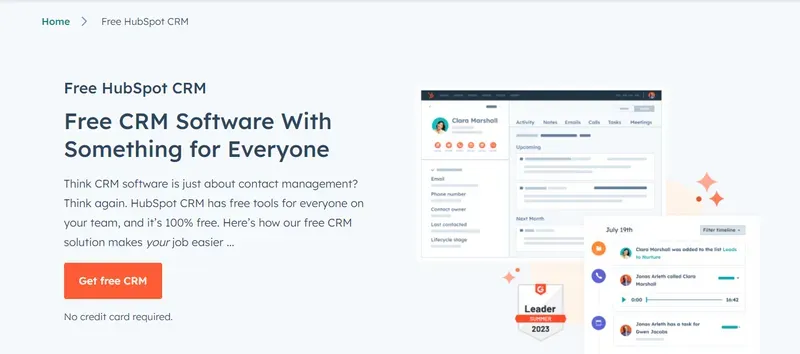
HubSpot CRM is recognized as a cloud-driven customer relationship management (CRM) software solution. It is meticulously designed to help businesses manage their customer engagements across the entire customer lifecycle. The main goal is to provide businesses with all the necessary tools to attract, captivate, and convert prospects into customers, and grow those customer relationships over time.
HubSpot CRM is equipped with a wide range of features aimed at boosting customer retention efforts. This suite of tools allows businesses to nurture and maintain strong connections with their customers, keeping them engaged and satisfied. Through streamlined communication channels, personalized marketing strategies, and insightful analytics, HubSpot CRM ensures businesses can keep their customers returning.
- Simplified Customer Interactions: Navigating customer connections is simplified with HubSpot CRM, facilitating comprehensive management of customer interactions. From basic information like names and email addresses to more comprehensive details like phone numbers and social media profiles, contact management is seamless.
- Streamlined Sales Navigation: Navigating sales deals becomes effortless, allowing businesses to efficiently track and manage their sales deals, including critical elements like the deal’s phase, the key contact, and the expected closing timeline.
- Monitor Customer Interactions: Keeping tabs on every interaction shared with customers, including emails, phone conversations, meetings, and website visits, is meticulously orchestrated.
- Build Strong Customer Relations: Fostering connections is streamlined, enabling businesses to nurture their leads with customized content and proposals at the most impactful times.
With a strong reputation for being user-friendly, cost-effective, and feature-rich, HubSpot CRM has become a popular choice among companies of all sizes, serving over 150,000 customers across more than 100 countries.
Some of its advantages are:
- The ease of operation stands out, with an intuitive design making it straightforward to master its features, catered to both seasoned experts and those new to the field, ensuring a smoother, more efficient workflow.
- Budget-friendly options are a core aspect, emphasizing the combination of cost-effectiveness with quality, showcasing how to achieve great value without compromising on excellence.
- A vast array of functionalities and features to meet every business need, from streamlining workflows to introducing innovative solutions for new challenges.
- Exceptional customer support goes beyond just answering queries—it involves creating experiences that make customers feel valued and understood, turning them not only into loyal patrons but also into enthusiastic advocates for the brand.
Drawbacks of HubSpot CRM:
HubSpot CRM is renowned for its comprehensive features and sleek interface but also poses challenges for its users. Maneuvering its sophisticated platform may seem daunting at first, as the variety of functionalities could overwhelm, complicating what is ideally a straightforward process.
Furthermore, the escalating pricing structure, particularly with the addition of premium features and an expanding contact list, could strain the budgets of small businesses or startups. These intricacies paint a realistic picture of the HubSpot CRM experience – one filled with significant benefits but accompanied by limitations that necessitate careful navigation.
HubSpot CRM Rating:
HubSpot CRM boasts a noteworthy rating of 4.5 out of 5 stars on Capterra, based on over 22,000 positive testimonials. It also secures top rankings on reputable platforms such as G2 Crowd and TrustRadius, further cementing its reputation in the market.
3. Salesforce CRM
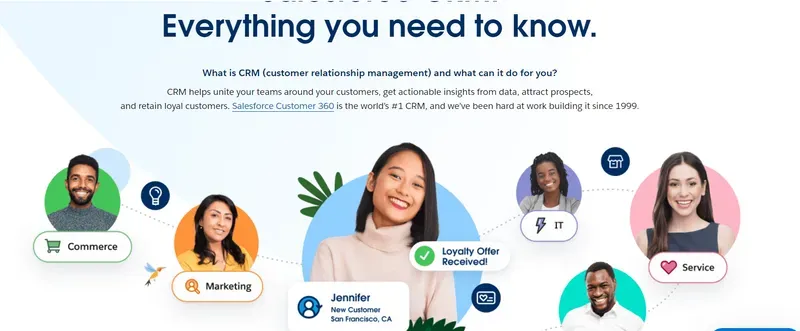
Salesforce CRM has established itself as a leading force in customer relationship management, crafted to aid enterprises in enhancing their customer relationships and retention. It includes a broad spectrum of features such as contact management, lead oversight, opportunity management, sales forecasting, and customer support, positioning it as a crucial tool for companies looking to flourish.
- Feature-rich: Salesforce CRM is equipped with a wide range of tools aimed at boosting customer retention for companies. For example, its advanced contact management features enable organizations to manage and streamline their customer interactions, while its lead management capabilities assist in identifying and fostering potential clients.
- Scalability: Salesforce CRM offers a flexible platform that grows with your business. It features various pricing options designed to fit the needs of both large and small enterprises.
- Ease of use: Known for its user-friendly interface and gentle learning curve, Salesforce CRM provides a suite of educational resources to help users fully leverage the software. This approachable system allows companies to quickly adopt and utilize its extensive functionalities.
- Interoperability: With its strong capability to integrate with a wide range of business software, from advanced marketing automation to comprehensive Ecommerce ERP systems, Salesforce CRM enables companies to streamline their operations and enhance their investment returns.
Downsides of Opting for Salesforce CRM for Customer Retention:
Salesforce CRM is recognized as a favorite among businesses for improving customer retention rate. Despite its widespread popularity, it’s not without its challenges, which may give some potential users pause.
One primary concern is the system’s complexity, which can intimidate those new to the platform. With a vast array of features, Salesforce CRM may overwhelm individuals who lack advanced technical skills. Navigating its extensive set of features demands a significant investment in time to learn, which might not appeal everyone.
Cost is another significant factor to consider. The comprehensive capabilities of Salesforce CRM come at a price that may not be accessible for every business, especially smaller or medium-sized operations. Beyond the initial subscription, expenses related to customization, adding features, and hiring skilled staff can accumulate, representing a substantial investment in customer retention activities.
Moreover, while Salesforce CRM’s wide range of customization options is advantageous, it can also present a challenge, as finding the ideal configuration can be a lengthy and iterative process. This need for continuous refinement to meet the business’s changing needs implies an ongoing commitment rather than a set-it-and-forget-it solution.
In conclusion, while Salesforce CRM is a potent tool for retaining customers, its complexity, potential costs, and the demand for perpetual customization are considerations that businesses must weigh judiciously. Identifying the optimal balance between functionality and ease of use may lead some to explore alternatives that align more closely with their requirements and capabilities.
Salesforce CRM Rating:
Salesforce CRM has garnered praise from users and experts, achieving an impressive 4.2 out of 5 stars on G2 Crowd and an exceptional 4.5 out of 5 stars on Capterra. This attests to its esteemed standing in the market.
4. Pipedrive

Pipedrive is primarily respected for its efficiency in sales and Customer Relationship Management (CRM). However, it is not often acknowledged for its customer retention capabilities. While it excels in managing and overseeing sales pipelines, it might lack the extensive array of customer retention features that are available in tools designed specifically for this function.
Advantages:
- Intuitive and approachable design: It brings users into a digital world where interactions are as natural as breathing. The carefully tailored interface ensures that navigation is smooth and simple. This platform isn’t just user-friendly; it’s a whole user-centric experience that makes digital spaces effortlessly accessible.
- Mastering sales pipeline management: It help in maintaining a smooth sales process and focusing efforts effectively. It involves diligently monitoring each sales opportunity from start to finish, ensuring no prospect is overlooked. A well-managed sales pipeline allows for prioritized actions, accurate revenue forecasting, and ultimately, a path towards exceptional sales team success. This approach enhances team efficiency, productivity, and satisfaction, resulting in increased sales and customer retention rates.
- Automation and email tracking: It can dramatically change how communications are managed. Integrating automation tools with email strategies not only simplifies routine tasks but also offers deep insights into recipient behavior. Access to email tracking empowers making informed decisions to increase engagement significantly. This shift towards technology-driven efficiency revolutionizes email communications, ensuring every message is impactful.
Challenges of using PipeDrive
The provision of a basic set of features designed to keep customers engaged and it could possibility of need additional tools to enhance customer retention strategies.
Pipedrive Rating:
Pipedrive is highly regarded for its foundational sales and CRM functions, regularly earning high praise. The platform is frequently rated around 4.5 out of 5 across various review sites, showcasing its effectiveness and popularity.
5. Freshdesk
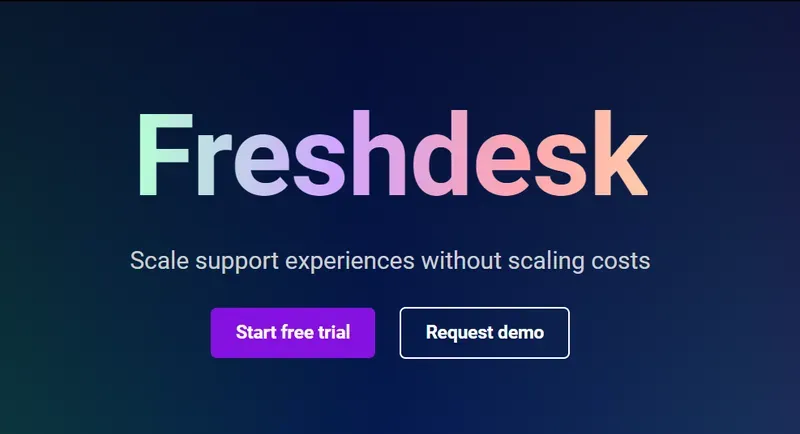
Freshdesk is designed as a sophisticated tool aimed at boosting customer support and engagement, leading to enhanced customer retention. The tool is crafted to facilitate seamless and efficient interactions.
Advantages:
- Simplified Design: Renowned for its intuitive design, it is appreciated for welcoming companies of all sizes with its user-friendly appeal.
- Integrate Multiple Platforms: This service enables businesses to connect with their clientele across various platforms, including emails, instant messaging, and social networks, ensuring engagement where customers are most active.
- Automate Customer Queries: Its automation feature effortlessly handles and sorts customer queries, bringing ease and efficiency to operations.
- Extensive Resources: It offers an extensive knowledge base and self-service capabilities, empowering customers to resolve their issues independently.
- Analytics Features: With powerful analytics and reporting features, it delivers valuable insights that help in enhancing customer service and boosting retention rates.
Challenges:
- Pricing: Budget considerations are often paramount for smaller enterprises.
- Restricted Personalization: The possibility for in-depth customization may not fully align with other options available.
Choosing Freshdesk presents itself as an excellent decision for businesses seeking a straightforward and comprehensive support system. Its strengths in automation, analytics, and self-service capabilities provide companies with an optimal solution for improving customer support and retention.
FreshDesk Rating:
Freshdesk consistently earns more than 4 out of 5 stars, and is commended for its ability to boost customer support and engagement.
6. Help Scout

Help Scout serves as a dedicated platform focusing on the enhancement of customer retention through the provision of exceptional customer support and service.
Advantages:
- Easy to Navigate: The platform boasts a straightforward and user-friendly interface, enabling teams to handle customer communications and queries with ease.
- Collaboration Platforms: It promotes seamless teamwork, ensuring that problems are solved more efficiently and customer support is significantly improved.
- Tailored Connections: The platform offers the capability for personalized interactions with customers, significantly enhancing their experience.
- Self-Help Repository: Equipped with a self-help repository feature, it facilitates the creation of resourceful aids for clients.
- Automation: Featuring automation capabilities, the tool streamlines the routing and handling of support tickets effortlessly.
Drawbacks of Help Scout:
Help Scout shines in offering stellar support services, although it may not be the go-to solution for those seeking advanced marketing features. At its core, Help Scout is dedicated to improving the management of customer interactions, rather than leading the charge in innovative marketing strategies. Furthermore, a few users have found integrating third-party tools into their setup can be somewhat challenging.
Help Scouts Reviews:
Help Scout enjoys a stellar reputation, with user reviews frequently averaging a robust 4.5 out of 5 stars. This rating highlights its proficiency and reliability in enhancing customer support and retention.
7. Qualaroo
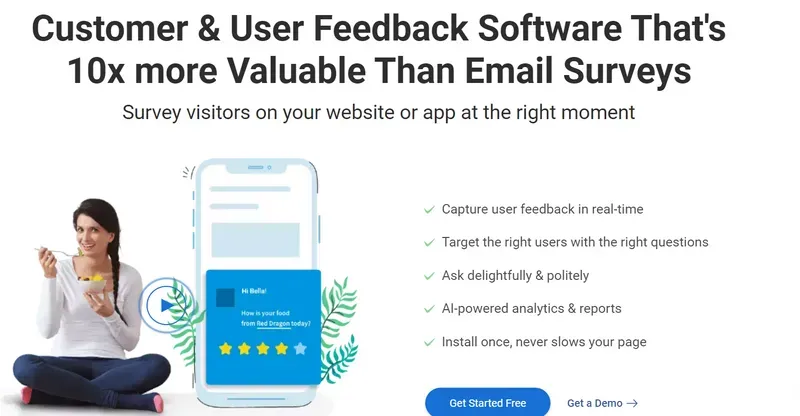
Qualaroo is recognized as a leading customer retention tool that excels in gathering crucial customer feedback. Its core objective focuses on enhancing the user experience and strengthening customer loyalty by effectively soliciting feedback.
Advantages of using Qualaroo:
- Collecting Insightful Feedback: The tool excels in gathering essential insights from customers through the use of in-depth surveys and detailed feedback forms.
- Smooth Compatibility: It seamlessly integrates with a multitude of tools and platforms, providing flexibility for businesses across various industries.
- Intuitive Design: The interface of the tool is designed to be user-friendly, making it easier for businesses to launch and manage feedback campaigns.
- Data Analytics: Powerful data analytics capabilities offer businesses actionable insights, helping them to improve strategies for increasing customer retention.
Drawbacks:
Here are some challenges and limitations that could arise and are worth considering:
- Pricing: The cost may appear relatively high for smaller businesses.
- Mastering the Art: Learning to efficiently use complex functions could require a significant adjustment period.
- Restricted Capabilities: Some users might find it lacks advanced marketing and communication tools.
For businesses aiming to deepen their understanding of customer behavior and enhance retention, a platform known for its user-friendliness and detailed analytics can be invaluable in boosting customer engagement.
Qualaroo Rating
As for its performance, the platform is generally well-received, with average ratings ranging from 4.2 to 4.5 out of 5. These ratings highlight its effectiveness in collecting and analyzing customer feedback.
8. ProfitWell

ProfitWell has positioned itself as a leading customer retention analytics platform, tailored specifically for businesses that operate on a subscription model. The software offers a comprehensive suite of tools aimed at enhancing subscription analytics, recognizing revenue, and minimizing churn rates, thus increasing customer retention rates.
The Upsides of ProfitWell:
ProfitWell has ton of features which brands can use to increase customer retention rates, some of them are:
- Detailed Analytics: Delve into the specifics of a subscription business with extensive metrics and a deep understanding of customer behavior.
- Churn Clarity: Vital insights into the reasons behind customer departure are provided, helping businesses to reduce the loss of their client base.
- Recognizing Revenue: The effortless recognition of revenue streamlines financial management.
- Easy to Use: Known for its user-friendly interface, it seamlessly integrates with numerous platforms for ease of use.
- Complimentary Edition: An option without any charges is available for businesses to start with basic functionalities, offering an efficient and straightforward beginning.
Drawbacks:
- Costing: The cost factor may lean towards the higher side for modest-sized enterprises.
- Advanced Features: A Journey Beyond the Basics
Choosing this solution can be incredibly beneficial for businesses in the subscription sector, as it provides insightful analytics on subscriptions and effective strategies for reducing churn, serving as an ideal partner for subscription-based businesses.
ProfitWell Rating
This solution is highly praised, with an impressive average score of 4.5 out of 5 based on user feedback.
How to choose the right customer retention software for your business?
When seeking the ideal customer retention software for an enterprise, it’s vital to consider a range of essential factors:
- Clear understanding of business needs: Recognizing specific goals and challenges related to customer retention is crucial. Identifying these allows for a better assessment of suitable software solutions designed to meet specific objectives and address any issues.
- Budget considerations: The cost spectrum for customer retention software is broad, ranging from affordable options to more significant investments. It’s important for businesses to establish a budget beforehand to maintain financial stability and avoid overspending.
- Feature prioritization: With the vast array of available features in customer retention software, businesses should pinpoint the essential tools that align with their priorities. This approach helps in focusing on software that meets all required criteria.
- Ease of use: Choosing software that is easy for the team to use is a priority. Solutions with intuitive and user-friendly interfaces are preferred to ensure efficient operation.
- Integration capabilities: Opting for customer retention software that integrates seamlessly with the existing business software platforms is crucial. This integration supports optimal workflow optimization and maximizes the value of the investment.
Conclusion
Maintaining a strong customer base is essential for the success of any business. Successfully keeping customers coming back not only increases sales but also reduces expenses, fostering a loyal customer base.
Customer retention software serves as a valuable tool in achieving customer retention goals. It provides insights into customer preferences and automates tasks such as marketing and customer service, thereby enhancing customer engagement and boosting sales.
By engaging in meaningful communication and providing consistent support, the creation of lasting relationships and loyalty is encouraged. Through thoughtful interactions and reliable assistance, a community loyal not just to the products or services, but to the brand’s ethos and vision, is cultivated. This strategy not only improves customer satisfaction but also turns casual customers into dedicated brand advocates.


